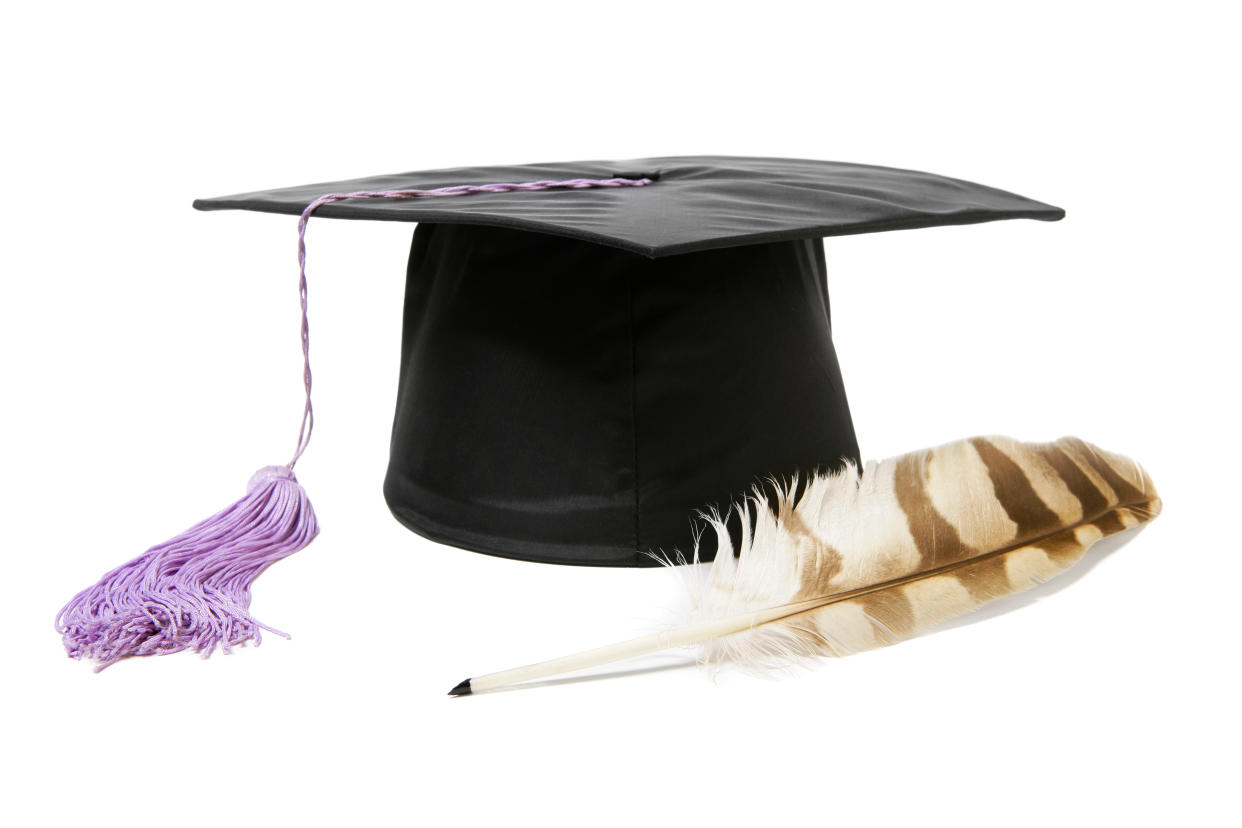High school graduate forced to remove traditional Navajo feathers from graduation cap: 'It's part of my identity'

A Utah teen of Navajo heritage was frustrated after a teacher at her high school gave her an ultimatum at her graduation ceremony: Either remove the traditional feathers from her cap or get banned from walking across the stage.
Tasheena Savala told the Salt Lake Tribune that she had worn several important symbols of her Navajo culture to her graduation on May 29, but most — including layered tribal necklaces — were hidden under her gown.
The only accessory that was showing was a trio of brown eagle feathers attached to her graduation cap. But that was apparently enough to warrant a reprimand from a nearby teacher who was reportedly trying to enforce the strict dress code for graduating seniors at Lehi High School in Lehi.
“What are those?” the teacher allegedly asked Savala as she was preparing to receive her diploma. “These feathers are sacred,” Savala replied. “They represent honesty, truth, strength and courage.”
That’s when the teacher told her to “take them off” or he would confiscate them and prevent her from participating in the ceremony. As the procession music started, the teacher stood his ground. So Savala reluctantly removed the feathers and lined up with the other graduates.
What ceremony attendees couldn’t see as Savala valiantly walked across the stage was the disappointment she was feeling at being forced to choose between two things that were very important to her: a personal milestone and a family tradition.
“In my culture the elders say that the eagle is the highest-flying bird and so when you see an eagle, you’re supposed to say a prayer so that the eagle can take it to the creator,” she told Fox 13. “This is how I was expressing myself. To me, my eagle feathers were just as important as my cap and gown.”
Savala said it took her family years to secure the feathers. The girl’s uncle had to first obtain permit, then wait to receive an eagle that had died naturally, in keeping with the strict requirements of federal law.
Savala’s mother, Natasha Beletso, told the Salt Lake Tribune that the family had to pluck the feathers themselves. Then the girl’s uncle chose them to gift them to her as a special honor. The feathers are to be reserved exclusively for special occasions, like graduation, according to Navajo tradition.
Savala said her culture “is a really big deal to me,” but she still can’t understand why the the feathers were such a big deal to school administrators. “There was no reason why I should have had to take the eagle feathers off,” she said. “They weren’t bothering anybody.”
But the Alpine School District said there was a very good reason: The feathers violated rules they had clearly shared before the ceremony. The district released a statement that read, in part:
“Lehi High School sent notifications out to their graduates and parents, held an informational assembly explaining expectations for the formal graduation, prior to the May graduation ceremony. Any exception for graduation procedures were addressed to administration by students or parents prior to the graduation. The school was not aware of this request…
“The teacher was following the set procedure by the school, that no cap was to have decoration on it… We will continue to study and refine our graduation procedures and processes, set clear expectations for notification to the school for students and parents who are seeking unique circumstances outside of school requirements.”
Lehi High Principal Doug Webb said that if school officials had known of Savala’s desire to don the feathers ahead of time, “we would have taken it into consideration.”
He said the perceived slight made him “feel terrible,” but the decision was definitely not a discriminatory one based on ethnicity. “There are so many things that go on before graduation with 430 students,” he said, “that it gets pretty rote with decisions about what students have on.”
Native Americans represent the vast minority in the Alpine School District: about 1.2 percent, and just .5 percent in Lehi High School, according to the Salt Lake Tribune. The rights of indigenous Americans are protected in Utah, and it would have actually been illegal if the teacher had removed the feathers himself, said Harold Foster, the Native American specialist with the Utah Board of Education.
But Savala’s situation is not only a matter of law — it’s also a matter of religious freedom and personal wellbeing, said Moroni Benally, a Navajo activist and cofounder of the Utah League of Native American Voters, to the Salt Lake Tribune. “There are mental and emotional implications to something like this,” Benally said.
Ultimately, Savala said she did enjoy her graduation ceremony, but hopes the school district will reconsider its dress code going forward — especially because she has a younger brother who will be graduating next year.
“If he wants to wear eagle feathers,” she said, “he [should] be allowed to.”
Read more from Yahoo Lifestyle:
Follow us on Instagram, Facebook, and Twitter for nonstop inspiration delivered fresh to your feed, every day.